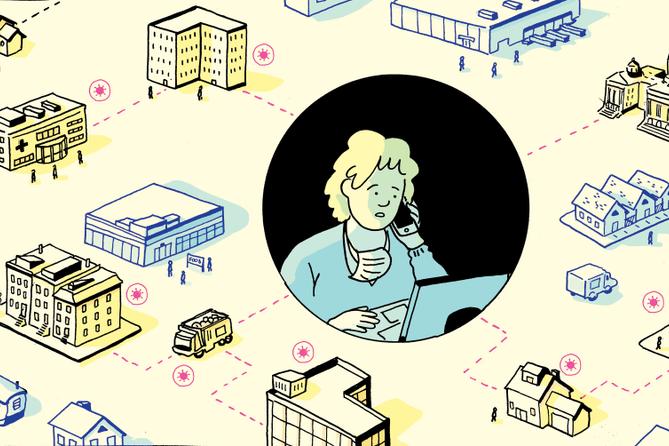Spotlight PA is an independent, nonpartisan newsroom powered by The Philadelphia Inquirer in partnership with PennLive/The Patriot-News and other news organizations across Pennsylvania. Sign up for our free weekly newsletter.
HARRISBURG — The Pennsylvania Health Department last week abruptly canceled a session to train volunteers to trace the contacts of people infected with the coronavirus, a critical practice in slowing the spread of COVID-19.
Despite the state’s struggles to keep case counts low, the department told volunteers it planned to wait until the fall to resume the training, according to emails received by two people who signed up for the program, obtained by The Inquirer and Spotlight PA.
“August is usually a month filled with families taking time for a vacation, so we are looking to the fall to begin training again,” an emergency workforce coordinator with the department wrote in an email sent July 30. “Stay safe, avoid stress and enjoy time with your family.”
The email was silent on an announcement the state would make just the next day: a $23 million plan to hire 1,000 contact tracers.
Maggi Mumma, a spokesperson for the Health Department, said anyone who applied to volunteer would be notified about the paid opportunities. The training was canceled partly because of technical challenges, she said, and partly because the department was “transitioning to hire” for the paid positions.
“We are committed to working with these individuals as we hire for the many contact tracing positions available,” Mumma said.
As of Monday afternoon, volunteers who spoke to The Inquirer and Spotlight PA had yet to hear anything from the state about the new plan. An email with information later went out just before 8 that evening.
After decreasing its number of daily coronavirus cases through widespread business closures and stay-at-home orders, Pennsylvania is seeing a resurgence of COVID-19. Contact tracing — the practice of locating people who have come into contact with infected individuals and asking them to quarantine — is considered one of the best ways to slow the spread of the virus.
While the Health Department has defended its contact tracing capacity as adequate, public health experts say the state is woefully understaffed. Through a patchwork system of state health nurses, county health departments, and nonprofits, there are about 650 people currently doing this work in Pennsylvania.
The state should have between 2,000 and 4,000 contact tracers, according to experts, while George Washington University’s Institute for Health Workforce Equity estimates the need at more than 5,700.
On Friday, the Department of Health announced it would pay the Atlanta-based staffing agency Insight Global nearly $23 million to “recruit, interview, hire, train, and support” 1,000 new contact tracers based in Pennsylvania.
The timeline to reach that goal is unclear. According to the contract, the company must onboard 250 contact tracers by Aug. 17 “or within 35 days of work beginning.”
After the initial 250 tracers are brought on, additional “resources” will be hired every two weeks “or on a timeline as designated” by the department and the staffing company. The total number of contact tracers “can be increased or decreased” throughout the term of the contract.
That flexibility was intentionally written into the contract, said Mumma, the department spokesperson, so the state can meet the changing demands of the coronavirus pandemic.
“At any time, we can adjust our needs as necessary while balancing taxpayer dollars and the public safety and well-being of Pennsylvanians,” Mumma said.
Contact tracing is traditionally done by state health nurses, although their ranks have been decimated by years of budget cuts and court battles. Currently, the state is also relying on county and local health departments, health systems, nonprofits recruited by municipal governments, and some volunteers to do this work.
“Pennsylvania is rather a hodgepodge — some counties are better staffed than others,” said Lyle Ungar, a professor of computer and information science at the University of Pennsylvania.
Still, he said, “no matter how you do the numbers, we’re understaffed.”
Aside from more tracers, Pennsylvania needs faster turnarounds on test results for its tracing program to be effective, Ungar said.
“If you want to make a difference in who’s getting sick, you need to reach them before they start infecting others,” he said. “If you wait a week, it’s gone — you’ve already infected people.”
As the state made plans to lift restrictions on counties this spring, allowing businesses to reopen and people to freely leave their homes, the Wolf administration vowed to ramp up contact tracing through partnerships, though state officials repeatedly declined to provide specific numbers.
Members of the public were told they could get involved through ServPA, the state’s online emergency volunteer registry. More than 1,300 people have applied, Mumma said.
She added that the department will continue to accept new applications, though “volunteers may experience an onboarding delay as we continue to expand part- and full-time paid contact tracing positions.”
Aneri Pattani of Spotlight PA contributed reporting.
100% ESSENTIAL: Spotlight PA relies on funding from foundations and readers like you who are committed to accountability journalism that gets results. If you value this reporting, please give a gift today at spotlightpa.org/donate.
